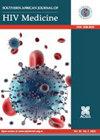对WhatsApp临床讨论组作为继续医学教育论坛在南非东开普省一群医生管理复杂的艾滋病毒和结核病临床病例中的作用进行了描述性分析
IF 1.6
4区 医学
Q4 INFECTIOUS DISEASES
引用次数: 25
摘要
背景随着南非艾滋病毒项目规模的扩大,艾滋病毒/结核病病例的发生往往超出了初级保健临床医生的临床范围。在南非的东开普省,卫生设施在地理上分布广泛,学术机构之外的专家数量存在差异。这项研究的目的是描述WhatsApp及其作为替代学习工具的使用,以提高临床医生对复杂HIV/TB病例的专业管理。目的分析临床医生使用WhatsApp聊天群作为学习工具的情况;在参加WhatsApp病例讨论小组后,评估临床医生对管理复杂的艾滋病毒和结核病患者的信心;描述所感知的聊天群作为学习工具的有用性;在WhatsApp等公共平台上分享患者病例详细信息时,了解临床医生对知情同意书的了解和使用情况。方法在一组来自EC的临床医生中进行了一项观察性的横断面研究,该临床医生是WhatsApp HIV/TB临床讨论小组的一部分。使用结构化匿名互联网问卷收集数据,并使用描述性和分析性统计数据与Epi-Info进行分析。结果分析发现,大多数参与者从小组参与中获得了新的临床信心。这与小组随访中小组参与度的增加有关(比值比[OR]48.13[95%置信区间[CI]4.99-464.49]);张贴问题(OR 3.81[95%CI 1.02–18.48]);在“新”临床见解的报告中(OR 23.75[95%CI 3.95-142.88]);在参考旧病例材料(OR 21.42[95%CI 4.39–104.84])和使用同伴指导来管理病例(OR 48.13[95%CI 4.99–464.49])方面。然而,在社交媒体上发布患者详细信息时,参与者对知情同意书的了解和实际使用存在差异。结论我们的研究结果支持在医疗环境中使用WhatsApp作为同龄人和专家之间的有效沟通、远程学习和支持手段。本文章由计算机程序翻译,如有差异,请以英文原文为准。
A descriptive analysis of the role of a WhatsApp clinical discussion group as a forum for continuing medical education in the management of complicated HIV and TB clinical cases in a group of doctors in the Eastern Cape, South Africa
Background As South Africa’s (SA) HIV programme increases in size, HIV/TB cases occur that are often beyond the clinical scope of primary healthcare clinicians. In SA’s Eastern Cape (EC) province, health facilities are geographically widespread, with a discrepancy in specialist availability outside of academic institutions. The aim of this study is to describe WhatsApp and its use as an alternative learning tool to improve clinicians’ access to specialised management of complicated HIV/TB cases. Objectives To analyse clinicians’ use of the WhatsApp chat group as a learning tool; to assess clinicians’ confidence in managing complicated HIV and TB patients after participating in the WhatsApp case discussion group; to describe the perceived usefulness of the chat group as a learning tool; to understand clinicians’ knowledge and use of informed consent when sharing patient case details on a public platform such as WhatsApp. Method An observational, cross-sectional study was conducted among a group of clinicians from the EC that formed part of a WhatsApp HIV/TB clinical discussion group. Data were collected using a structured anonymous Internet questionnaire and analysed with Epi Info, using descriptive and analytic statistics. Results The analysis found the majority of participants had gained new clinical confidence from group participation. This was associated with the increased group engagement in group follow-up (odds ratio [OR] 48.13 [95% confidence interval [CI] 4.99–464.49]); in posting questions (OR 3.81 [95% CI 1.02–18.48]); in reports of ‘new’ clinical insights (OR 23.75 [95% CI 3.95–142.88]); in referencing old case material (OR 21.42 [95% CI 4.39–104.84]) and in the use of peer guidance to manage cases (OR 48.13 [95% CI 4.99–464.49]). However, there was a discrepancy in participants’ knowledge and actual use of informed consent when posting patient details on social media. Conclusions Our study findings support the use of WhatsApp in a medical setting as an effective means of communication, long distance learning and support between peers and specialists.
求助全文
通过发布文献求助,成功后即可免费获取论文全文。
去求助
来源期刊
CiteScore
2.80
自引率
11.80%
发文量
41
审稿时长
>12 weeks
期刊介绍:
The Southern African Journal of HIV Medicine is focused on HIV/AIDS treatment, prevention and related topics relevant to clinical and public health practice. The purpose of the journal is to disseminate original research results and to support high-level learning related to HIV Medicine. It publishes original research articles, editorials, case reports/case series, reviews of state-of-the-art clinical practice, and correspondence.

 求助内容:
求助内容: 应助结果提醒方式:
应助结果提醒方式:


